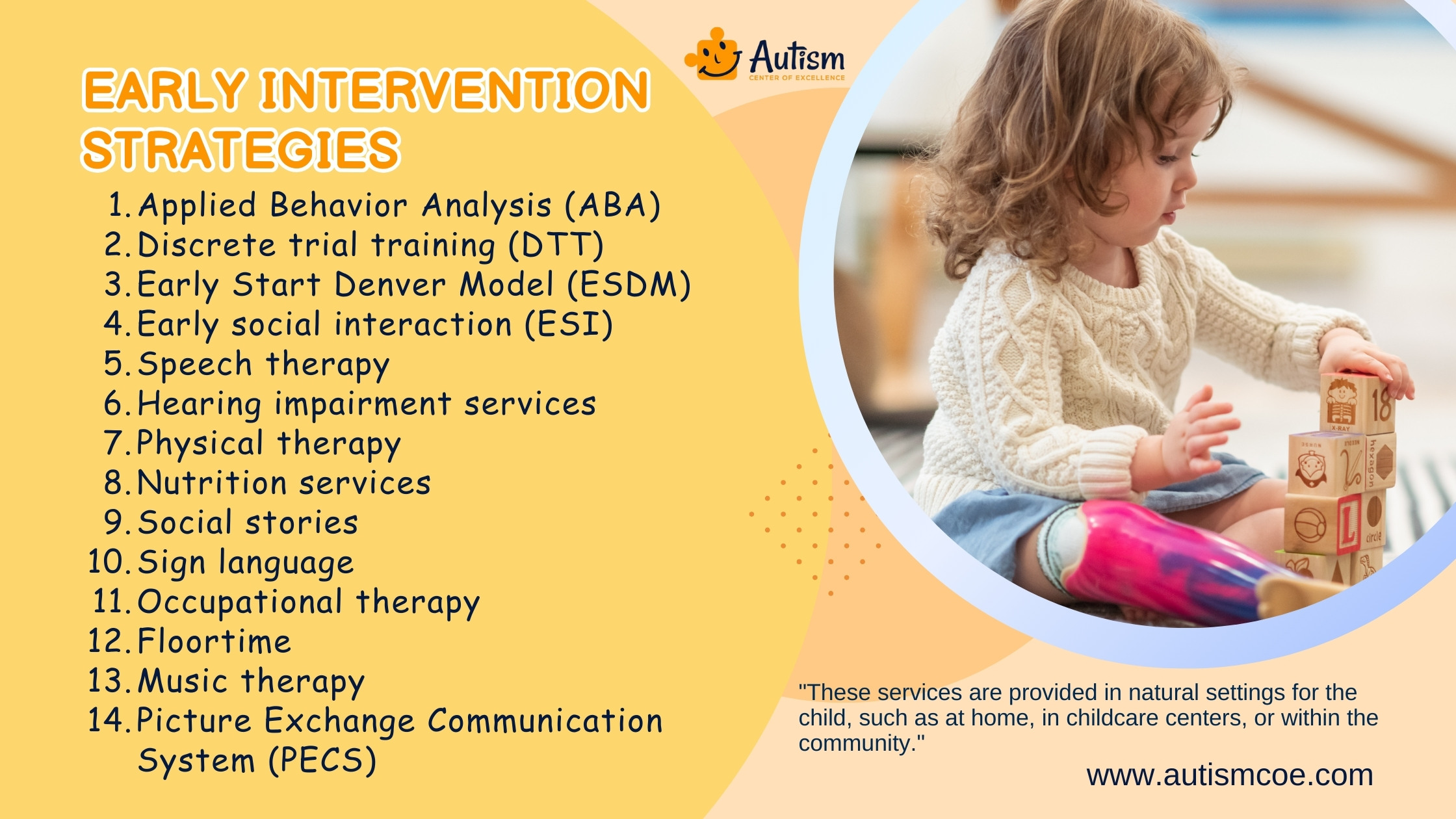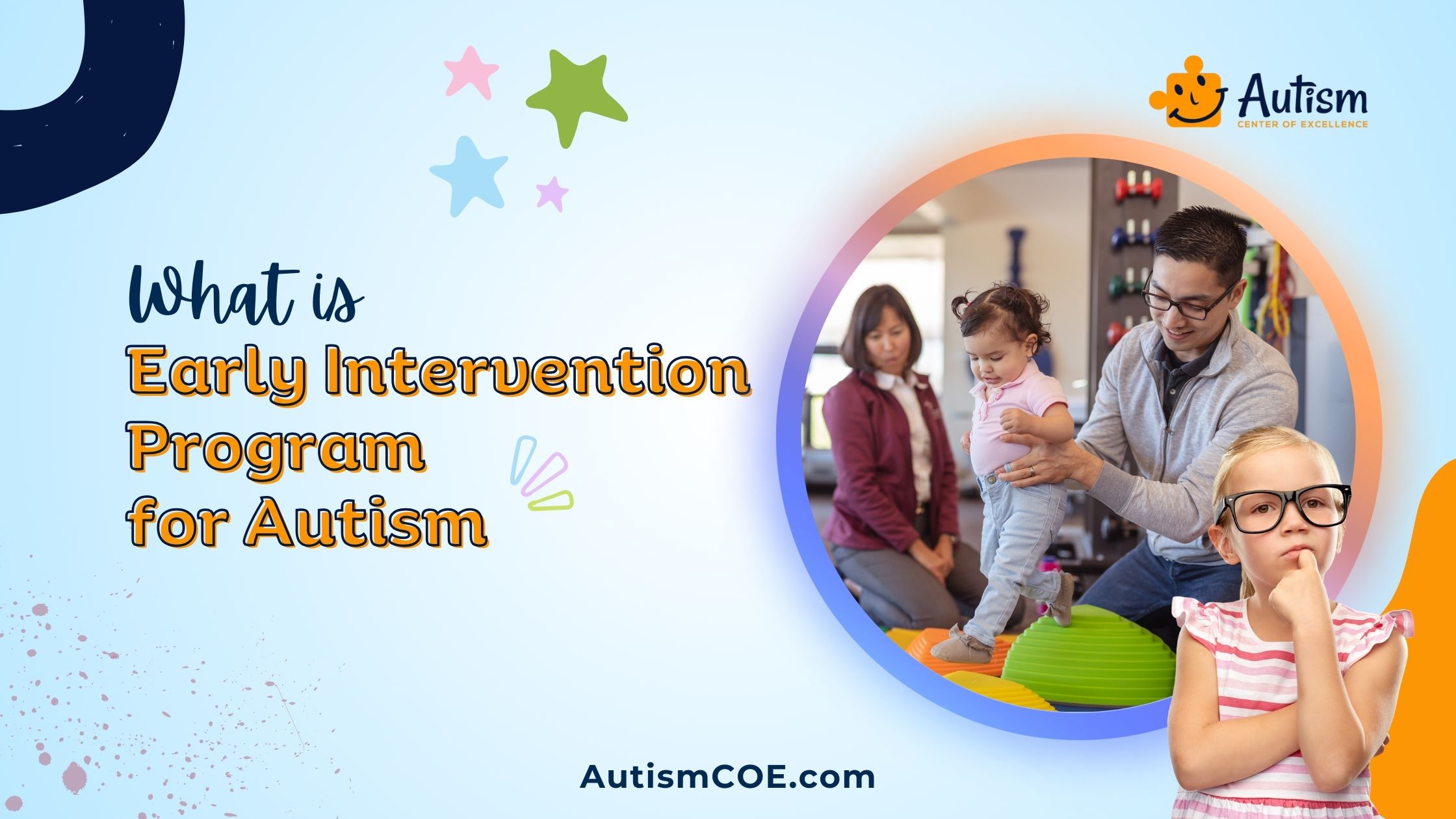For many parents, the early years of a child’s life can be equally parts joyous and anxiety-inducing. This critical time of growth and expansion has significant consequences as it serves as an important basis for the future of a child’s development. At the heart of this process, Early Intervention Programs (EIPs) offer a beacon of hope and support for families with very young children with autism or developmental challenges.
Early intervention plays an important role for children with autism since it gives them the highest chances of developmental progress and better results in terms of the long-term future. By identifying autism features and taking action through Early Intervention Services, children can start developing essential skills and achieving the highest level of performance. As a parent or caregiver, you should get all the information about the different interventions to ensure your child gets the needed services.
What is Early Intervention Program?
Early Intervention Program refers to a series of therapeutic and educational services and strategies that are designed to support children with developmental delays, disabilities, or Autism Spectrum Disorder (ASD) from birth to three years old. EIPs are rooted in the philosophy that early identification and intervention can significantly mitigate the impact of Developmental Issues on a child’s development, enhancing their overall quality of life. The Individuals with Disabilities Education Act (IDEA) mandates early intervention services, ensuring evaluations, assessments, and Individualized Family Service Plans (IFSPs) are provided at no cost to parents.
Early Intervention covers a wide range of programs and services designed to bring positive changes to the developmental pathway of children with Autism Spectrum Disorder (ASD). Early intervention focuses on assisting babies and toddlers with developmental delays or disabilities, aiming to help them develop essential skills in various areas such as physical, cognitive, communication, self-help, and social-emotional skills. The primary goal of Early Intervention is to increase the child’s ability to learn, socialize, actively take part in family and community life, and build strong relationships with others.
The interventions are typically high-quality, evidence-based services designed to:
✅ Enhance development
✅ Encourage independence and avoid institutionalization or the need for other special services as life progresses
✅ Enhance adaptability and reduce family stress.
✅ Avoid the creation of secondary disabilities and functional limitations.
What are Signs that a Baby Might Need Early Intervention Services?
Parents frequently worry about what the warning signals are that point to the potential need for early intervention due to developmental delay. In babies and toddlers, these can include:
- Lack of response to their name by 12 months
- Not looking at things to show interest
- Shy away from eye contact and want to be alone
- Having trouble understanding other people’s feelings or talking about their own feelings
- Being delayed in speech and language development
- Repetitive movements of the body (e.g., rocking, flapping)
- Becoming angry with the slightest alteration
- Having a weird reaction to the way things sound, smell, taste, look, or feel
- Losing skills they once had (e.g., no longer saying a word they were using)
- Omitting the use of toys to provide their own games and build creative thinking
If any of these signs are observed, it is crucial to get the child evaluated to identify any developmental delays or disabilities. Both parents and pediatricians can initiate this evaluative process to determine eligibility for necessary support and services tailored to the child’s specific developmental needs.
What is the Earliest Age for Early Intervention?
Early intervention services are designed to help infants and toddlers who are experiencing developmental delays or disabilities. An eligible child can receive services from their local program. The earliest age at which these services can be started is from birth. The Early Intervention Foundation covering the period from birth to 3 years of age is important to identify and address any developmental concerns as early as possible for the eligible child.
“The American Academy of Pediatrics recommends that all children receive autism-specific screening at 18 and 24 months of age, and the earlier a diagnosis is made, the better the chances of taking advantage of early intervention services.”
Join Our Weekly Newsletters!
Subscribe now to stay updated with our latest email updates.

What is Included in the Early Intervention Program?
When a family gains an understanding that early intervention is needed, an evaluation will be arranged by the Autism Early Intervention Program of their locality. An early intervention team will play a crucial role in supporting the child and family during this process. At the end of the evaluation period, an Individualized Family Service Plan (IFSP) will be drawn, which will contain the goals for the family and required services among the goals for the child, including various early intervention supports.
Early Intervention Strategies can include:
⭐ Applied Behavior Analysis (ABA)
⭐ Discrete trial training (DTT)
⭐ Early Start Denver Model (ESDM)
⭐ Early social interaction (ESI)
⭐ Speech therapy
⭐ Hearing impairment services
⭐ Physical therapy
⭐ Nutrition services
⭐ Social stories
⭐ Sign language
⭐ Occupational therapy
⭐Floortime
⭐ Music therapy
⭐ Picture Exchange Communication System (PECS)
Such services are delivered in the most natural atmosphere possible for the kid, which can be at home, child care centers, as well as in the community.
Suggested – Unit 2: What are the Types of Early Intervention for Autism
Autism Early Intervention at Home
Autism Early intervention begins with the family setting, where the child lives. Parents, as primary educators and defenders, are often the ones who take the lead in advocating for their children’s interests. The team of teachers and therapists can collaborate with the family on the development of a day-to-day individualized program for the child, addressing their unique requirements and desired outcomes.
Home-based Early Intervention may include:
Teaching Parents Strategies for promoting development through daily routines and activities
Providing Play-Based Interventions
Offering support for Managing Challenging Behaviors
Teaching communication skills through techniques such as Picture Exchange Communication System (PECS) or American Sign Language
Focusing on family support and reducing stress through counseling or support groups
Why is Early Intervention Important in Autism Therapy?
The first few years of life are when the human brain experiences significant neurogenesis which is best dealt with through intervention. It offers an excellent chance to lay down the necessary neural pathways that later will support education, behavior, and health.
It is crucial to monitor a child’s development and provide resources for parents to address any potential developmental delays. Studies show that beginning intervention before the second birthday would correlate with superior long-term results. Autism Early Intervention can:
Leverage the inherent strengths and competencies of the child via supportive relationships.
Cater to the child’s overall needs including emotional well-being and personal happiness.
Help the family by decreasing the stress that is often associated with the situation and allow each family member to gain a better comprehension and support for the child.
Set up a living environment that is enabling for them, so they can have a life of fulfillment with as much independence as possible.

Evidence of Early Intervention Success
Various research studies have shown that early intervention programs do help to enable positive developments in children with autism. Treatments including the Early Start Denver Model (ESDM) which begins at 12 months of the child have shown that such intervention results in major improvements of IQ, language, and adaptive behavior. Other Early Intervention Strategies, such as the Applied Behavioral Analysis (ABA) demonstrated further outcome improvements. Early intervention has also been proven to reduce the possibility of using Special Education services and improve future self-functioning and independence.

ABA-Based Early Intervention Programs
Applied Behavioral Analysis (ABA), is a very successful technique used by practitioners to help children with Autistic Spectrum Disorder early on. A child’s learning and mastering new skills and not disrupting his learning by reducing improper response behaviors are the aims of ABA. It is done through positive reinforcement, breaking down tasks into small components, and training through repetition and regular practice.
A service coordinator plays a crucial role in guiding families through the process of developmental evaluation and the creation of an Individualized Family Service Plan (IFSP).
ABA-based Early Intervention Therapy Programs:
Individualize treatment plans to meet the specific needs and interests of the child.
Systematically evaluate progress and adjust goals accordingly.
Work closely with the child’s family to ensure that techniques are integrated into everyday routines and activities.
Prepare the child for school by teaching School Readiness skills, such as following directions, paying attention, and interacting with peers and teachers.
ABA Early Intervention Therapy has been shown to precipitate marked progress in children’s capabilities, with such improvements including intelligence quotient, communication, and daily life skills. Children diagnosed at birth or those experiencing developmental challenges can receive early intervention services, ensuring families access support as soon as concerns arise.
Frequently Asked Questions & Answer
How do I Know If My Young Child is Making Progress with Early Intervention?
Following up on the changes during the autism intervention program is important since it identifies the way your child responds to the treatment procedure, adjusting the techniques and methods as suitable. Here are several ways to monitor your child’s progress:
- Review Goal Achievement
- Keep a journal of your child’s daily activities and behaviors
- Get feedback from professionals
- Parental Intuition
- Regular Screenings and Assessments
Which Professionals Typically Provide Early Intervention Services for Autism?
The 5 most qualified professionals typically involved in providing early intervention services for autism are:
- Board Certified Behavior Analysts (BCBAs)
- Speech-Language Pathologists (SLPs)
- Occupational Therapists (OTs)
- Developmental Pediatricians
- Special Educators
What is the Most Effective Intervention for Autism?
The intervention that is the most efficient for autism condition is interpersonal which varies depending on the needs of every person. Nevertheless, the ABA is certified to be the most effectual method of behavior conditioning, which method is applied in a way that especially reflects the knowledge of each individual. Other active autism interventions are speech therapy, occupational therapy, and social skills training. A personalized combination of these therapeutic methods usually gets the best outcomes.
When is It Too Late to Treat Autism?
It can never become “too late” to start a treatment process for autism. During the earliest stage that is, in the preschool years or sooner, Early Intervention Therapy is known to greatly enhance outcomes because it takes advantage of the brain’s natural plasticity. The same applies at any stage of development. Moreover, interventions can be modified to be age-neutral and still be able to reach and improve the quality of life, develop independence, and build socializing skills for older children, adolescents, and adults with autism.
Conclusion
For a kid who has autism, the first years involve many hard obstacles. However, there is also an enormous potential at the same time. At AutismCOE, we’re committed to unlocking this potential in every child we serve, providing a path to a brighter future. Early Intervention for Autism is to set off the child’s hidden abilities and capacities to help them build a good character foundation for long-term development. Families can have a bright and successful future through individualized aid, proven treatment modalities, and caring guardians. The achievement of each step, no matter how little is done, is a victory. Victory is not only for the child, their family, and the community that surrounds them and helps them fulfil their missions in life.
Please Note: The content of this blog is for informational purposes only and should not be considered a substitute for professional medical advice, diagnosis, or treatment. Consult a qualified health care professional for personalized guidance tailored to your specific situation.

Bhavika Bhasin
Bhavika Bhasin is the Research and Marketing officer at AutismCOE. She works with children and adults with ASD. Her clinical research includes evaluating various available autism screening and diagnosis methods and their efficacy. She is currently developing a novel screening exam that is indicated to be more accurate than the existing available exams. She is also writes articles papers for various publications.


